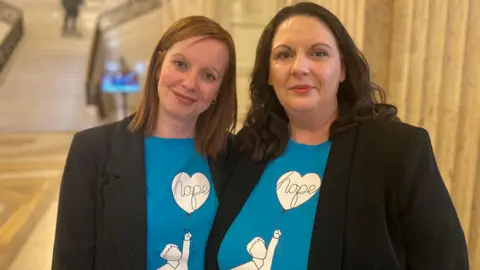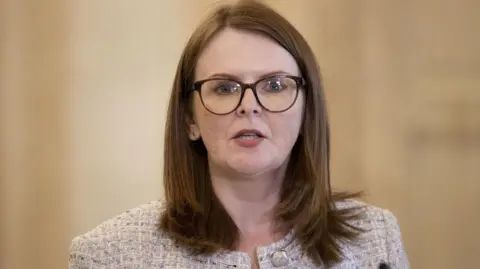SEN reform plans 'don't go far enough'
 BBC
BBCStormont proposals to improve support for young people with disabilities do "not go far enough", the mum of a boy with complex special needs has said.
Alma White set up a campaign Caleb's Cause, named after her son Caleb, in a bid to get the executive to change the level of support for school leavers with Special Educational Needs (SEN).
Automatic support to continue in education or training currently ends for SEN students when they leave school, with no legal protection.
On Monday, the Economy Minister Caoimhe Archibald announced a package of proposals including a "dedicated transition support service" to improve access to learning, support and guidance.
'Not fair at all'
Alma White and Denise Geary went to Stormont on Monday to meet the minister about her plans, but said they had been left "disappointed" that legislation was not being considered.
They have been calling for legislation to underpin a young person's special needs until they turn 25, similar to a system already in place in England.
Stormont's proposals seek to extend the current "cliff-edge" of support in Northern Ireland, which ends as soon as they leave school.
Mrs White said what the minister had outlined was not what she had expected and that she was "heartbroken".
"For some families it changes nothing, it reinforces a message that our children do not matter," she said.
"To be fair to the minister her heart is in the right place, but I do feel this is not fair at all."
She added that if the executive did not get serious and put more investment into this issue, the situation would deteriorate even further.
"Go and assess if you don't tackle it now let's just wait and see in next five years how expensive it's going to be," said Mrs White.
 PA Media
PA MediaThere are about 70,000 SEN students in Northern Ireland and 29,000 of them have an official statement outlining the support they need.
Currently, a child can receive a statement of SEN, which is a legal document setting out the support they should receive, in school.
A statement - and the support it mandates - ends when a child leaves school, rather than being in place up to the age of 25.
In contrast, in England an education, health and care plan (EHCP) outlines a young person's special educational needs up to the age of 25.
It is a legal document, which also describes the additional support they need in education or training and the outcomes they would like to achieve.
But an EHCP is only in place for young people in England, though there has been criticism that some councils fail to meet deadlines set out in the plan.
In Wales and Scotland there have been recent reforms to help young people with SEN transition from school.
The Department for the Economy estimates that there has been a 134% rise in demand for such services in Northern Ireland over the past two decades.
Stormont's independent autism reviewer Ema Cubitt said she understood that some families felt they had not been heard, but she believed the political will is there to change the system, despite the financial constraints that the executive is operating in.
"This is not one department, it's not one minister - this has to be coordinated and I really want to hear a clear voice from ministers saying they're going to do something," she said.
It is understood the measures proposed by the minister would be the most significant changes to the system in more than a decade.
Archibald told the assembly the proposals aimed to "break down the barriers that too often hinder young people with disabilities from reaching their full potential after school".
"These plans will require significant collaboration and I will work with colleagues across the executive to secure the resources and changes needed to support young people with SEN," she added.
SEN support proposals
The minister's proposals include:
- A dedicated transition support service to help young people "facilitate the move beyond school to subsequent learning pathways."
- A statutory assessment support model to extend support for young people with a statement after they leave school.
- Changes to the Department for the Economy's careers' service and increased access to apprenticeships and opportunities in higher education settings for those with learning disabilities.
In December, an independent review of Northern Ireland's education system, identified failings in the provision of services for children with special educational needs
